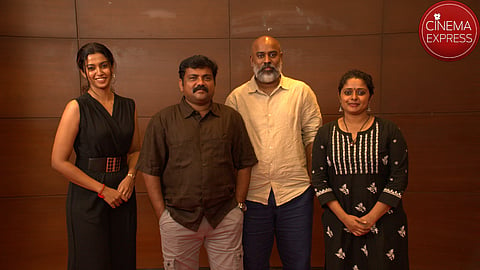

Every person has a voice, but does the world stop and hear every voice out there? In Madras Matinee, Kaali Venkat plays the role of Kannan, an autorickshaw driver, trying to make ends meet. His world is limited to his family, their future, and his auto. He doesn’t have exposure beyond this point, which makes him naïve in certain situations. Meanwhile, Roshni Haripriyan plays Deepika, Kannan's daughter and a techie trying to uplift her family’s economic situation. She carries the burden of trying to fulfil her family’s expectations of getting married, even while expecting agency in the arranged marriage market. But what connects the struggles of Kannan and Deepika is their sublime strength. This virtue of toiling silently, while trying to suppress every instinct that pushes them to implosion, is what makes Kannan and Deepika the people you observe every day, and yet, they are not the ones that stand out. When asked how his characters exhibit a sense of relatability to them, even though they are identifiably unique, Kaali says, “When I am on location, I actively try to observe the people around me and take in their characteristics. To me, this is an investment I make for my characters and the films I am in because I am not contributing anything financially.”
This naivete has made many of Kaali's characters feel relatable. “I am at a point in my career where I have done a lot of characters, most with different dialects, traits, and even gaits. But I think losing my natural self has helped me get into these characters,” says the actor, adding, “In Madras Matinee, the director gave me the space to play Kannan in a higher plane than he envisioned, which aided the character. Honestly, an actor's duty is complete when the director is convinced."
Talking about how she approached her layered character, Roshni says, “There is a teenage Deepika in the film, who stands up for her family when they face an issue. She remains that way as she grows up. We see its parallels in a later scene where she stands up for herself during a meeting with a prospective groom. "While she feels the pressure of needing to look after her family, and there is a pressure to get married, she rises beyond them and stands up for herself. When the screenplay has such scenes, it gets simpler to convey these emotions."
Even as audiences find these characters relatable, it is interesting how Kaali shares that there are times when actors find catharsis playing such roles. “I feel like Kannan has the characteristics of a few people whose struggles I have internalised through observation. I remember someone once telling me, ‘You have returned, but it feels like Kannan is still driving his auto somewhere.’ All of us try to portray characters that are relatable to the audience, but the magical connection happens only when the connection is organic,” says Kaali, who understands the importance of audience reception, especially since he comes from a theatre background. However, he doesn't shy away when asked if his background in theatre ever influenced his performance in Madras Matinee. “The experience you have from theatre rarely influences your acting in a film. Theatre is an actor’s medium, cinema is not,” says the actor. He substantiates this by saying, “In a play, we act with a live audience present, and whatever is delivered is what the play turns out to be. But a film has a director, and the entire cast and crew are following his directions. So while we may get a fundamental knowledge of the subject, the execution is different.”
Shelly Kishore, who plays the role of Kamalam, Kannan’s wife and Deepika’s mother in the film, has a different approach to her craft. “When I read a particular story, I have more questions about the character than inferences. It helps me get a proper visual of the character, and I can express it properly only when I fully lose my soul to it,” says Shelly, who signs off by giving her insight into what makes acting special. "Acting encourages one to express their voice with power," says Shelly, who adds a caveat. "Of course, when the director gives the space, and actors feel that contentment when the director's vision is fulfilled"